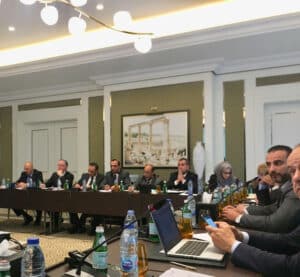A Jordanian stakeholder meeting debates labour issues upon the release of BWJ’s latest annual report.
The Jordanian garment industry has made significant progress on meeting key labour standards, according to a new report by Better Work Jordan. The Better Work Jordan Annual Report 2018: An Industry and Compliance Review issues showed notable achievements on a number of issues including the implementation of a new minimum wage and the signing of a new Collective Bargaining Agreement.

Speaking at the launch of the report, Tareq AbuQaoud, Programme Manager at Better Work Jordan said, “The findings highlight progress on a multitude of fronts in the industry and prove that it is possible to instigate sustainable change…. Better Work Jordan has helped the garment sector thrive and is striving to improve other sectors as well through cooperating with the Ministry of Labour and the Ministry of Industry and Trade.”
Other areas of improvement over the reporting period include fewer cases of discrimination related to working hours during Ramadan, better recruitment practices, lower incidence of excessive recruitment fees, and better practices with keeping time records. Further, the number of cases of passport withdrawal has decreased since the previous annual report – from 10 percent to three percent. Gender discrimination in the workplace has also dropped since the previous report – from 31 percent factories in 2016 to about seven percent in 2017.
The results, which reflect assessments over the period of January to December 2017, were showcased at the 37th Project Advisory Committee meeting held in Amman on 18, April. At the meeting was Abdullah Al-Jbour, former head of inspection at the Ministry of Labour and currently Assistant Secretary General for Technical Affairs, who noted, “With the combined efforts of the Ministry of Labour; Better Work Jordan; and The General Federation of Jordanian Trade Unions, and Jordan Garments, Accessories, and Textiles Exporters’ Association there have been many achievements in the garment sector. These accomplishments include dorm inspections, implementation of the unified contract, and an increase in exports.”
A highlight of the meeting was a reaffirmation by all members to start implementing the “zero recruitment fees” policy as of January 2019 as per a statement endorsed by the Project Advisory Committee earlier this year.
However, members of the committee observed that the industry continues to face a number of challenges. Ahlam Al-Terawi, a Coordinator at the General Trade Union of Workers in Textile, raised the issue of discriminatory working hours saying, “Factories give incentives to migrant workers for two to four hours of overtime and these incentives are not given to the Jordanian workers, this issue needs to be addressed.”
With worker absenteeism remaining a major issue, Project Advisory Committee members stressed the need to further educate the workers and raise awareness. Other members debated that workers shouldn’t be given incentives for showing up to work but rather be educated on the importance of being present and the significance of their roles in the workplace.
An additional challenge facing Jordan’s garment sector is a lack of recognition by European Union buyers, who are sometimes unaware that Jordan is eligible to export garments under the relaxed rules of origin regime agreed in 2016.
Other highlights of the meeting included comments from Minwer Abu Al Ghanam, Head of Inspection, and the Project Advisory Committee’s newest president, who expressed his interest in collaborating with Better Work Jordan, saying, “The establishment of the Memorandum of Understanding with Better Work Jordan and the Ministry of Labour in December 2016 had a crucial role in strengthening and improving the work conditions of the garment sector.”
Ilektra Tsakalidou, Policy Officer of Industrial Trade and Private Sector Development at the European Commission in Jordan added, “The European Union is working hand in hand with the International Labour Organization to ensure every single employee has decent work conditions.” On a final note, Farhan Ifram, CEO of MAS KREEDA Al Safi, a clothing manufacturer, said, “The garment sector is constantly improving and has many achievements. However, there is always room for improvement.”
———————————————————————————————-
The Jordanian garment sector makes up about 25 percent of Jordan’s total exports at over USD1.69 billion. The sector employs over 70,000 workers (16,643 Jordanians and 54,215 migrant workers) in 89 apparel factories. Bangladeshi workers make up more than half of the migrant workers in the sector (52 percent) followed by Indians who make up 17 percent of the migrant workers in the garment sector.
Better Work – a collaboration between the United Nations’ ILO and the International Finance Corporation, a member of the World Bank Group – brings together all levels of the garment industry to improve working conditions and boost the competitiveness of apparel businesses. Currently active in eight countries reaching more than two million workers, the programme creates lasting change through assessments, training, advocacy, and research.